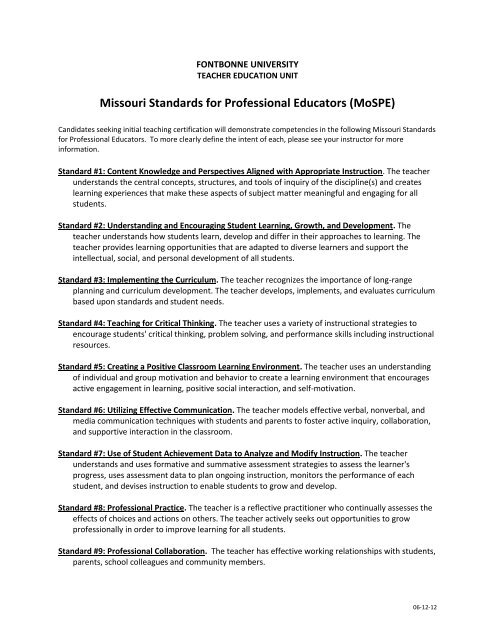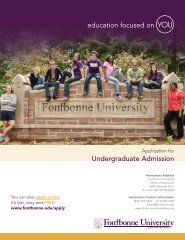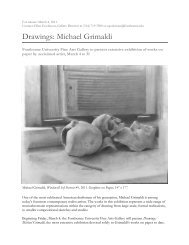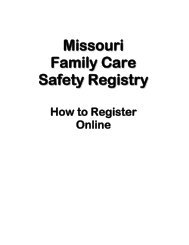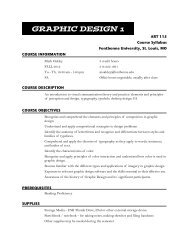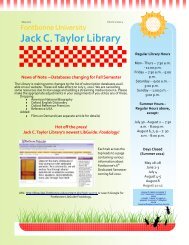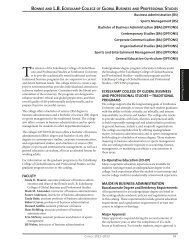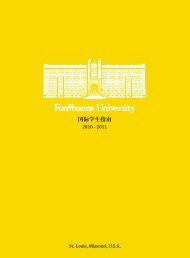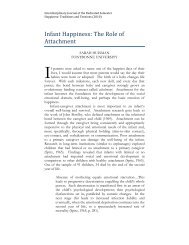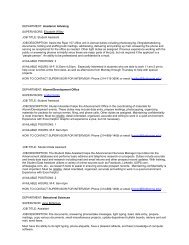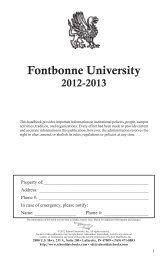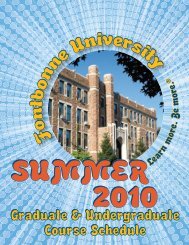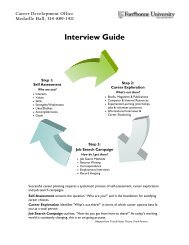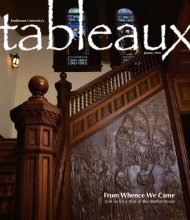Missouri Standards for Professional Educators (MoSPE)
Missouri Standards for Professional Educators (MoSPE)
Missouri Standards for Professional Educators (MoSPE)
You also want an ePaper? Increase the reach of your titles
YUMPU automatically turns print PDFs into web optimized ePapers that Google loves.
FONTBONNE UNIVERSITY<br />
TEACHER EDUCATION UNIT<br />
<strong>Missouri</strong> <strong>Standards</strong> <strong>for</strong> <strong>Professional</strong> <strong>Educators</strong> (<strong>MoSPE</strong>)<br />
Candidates seeking initial teaching certification will demonstrate competencies in the following <strong>Missouri</strong> <strong>Standards</strong><br />
<strong>for</strong> <strong>Professional</strong> <strong>Educators</strong>. To more clearly define the intent of each, please see your instructor <strong>for</strong> more<br />
in<strong>for</strong>mation.<br />
Standard #1: Content Knowledge and Perspectives Aligned with Appropriate Instruction. The teacher<br />
understands the central concepts, structures, and tools of inquiry of the discipline(s) and creates<br />
learning experiences that make these aspects of subject matter meaningful and engaging <strong>for</strong> all<br />
students.<br />
Standard #2: Understanding and Encouraging Student Learning, Growth, and Development. The<br />
teacher understands how students learn, develop and differ in their approaches to learning. The<br />
teacher provides learning opportunities that are adapted to diverse learners and support the<br />
intellectual, social, and personal development of all students.<br />
Standard #3: Implementing the Curriculum. The teacher recognizes the importance of long-range<br />
planning and curriculum development. The teacher develops, implements, and evaluates curriculum<br />
based upon standards and student needs.<br />
Standard #4: Teaching <strong>for</strong> Critical Thinking. The teacher uses a variety of instructional strategies to<br />
encourage students' critical thinking, problem solving, and per<strong>for</strong>mance skills including instructional<br />
resources.<br />
Standard #5: Creating a Positive Classroom Learning Environment. The teacher uses an understanding<br />
of individual and group motivation and behavior to create a learning environment that encourages<br />
active engagement in learning, positive social interaction, and self-motivation.<br />
Standard #6: Utilizing Effective Communication. The teacher models effective verbal, nonverbal, and<br />
media communication techniques with students and parents to foster active inquiry, collaboration,<br />
and supportive interaction in the classroom.<br />
Standard #7: Use of Student Achievement Data to Analyze and Modify Instruction. The teacher<br />
understands and uses <strong>for</strong>mative and summative assessment strategies to assess the learner's<br />
progress, uses assessment data to plan ongoing instruction, monitors the per<strong>for</strong>mance of each<br />
student, and devises instruction to enable students to grow and develop.<br />
Standard #8: <strong>Professional</strong> Practice. The teacher is a reflective practitioner who continually assesses the<br />
effects of choices and actions on others. The teacher actively seeks out opportunities to grow<br />
professionally in order to improve learning <strong>for</strong> all students.<br />
Standard #9: <strong>Professional</strong> Collaboration. The teacher has effective working relationships with students,<br />
parents, school colleagues and community members.<br />
06-12-12
COMMITMENTS OF THE RESPONSIBLE EDUCATOR<br />
I. PROFESSIONAL COMMITMENTS<br />
1. Exhibit enthusiasm <strong>for</strong> teaching as a profession and articulate a personal vision of<br />
educational goals<br />
2. Participate in class and field experiences in a manner befitting a professional educator<br />
3. Develop and refine standard oral and written communications skills that positively<br />
reflect upon the profession<br />
4. Effectively communicate, collaborate, and cooperate with colleagues, parents, and the<br />
larger educational community<br />
5. Respect the privacy of students and the confidentiality of in<strong>for</strong>mation as required by<br />
law<br />
6. Accept and use feedback <strong>for</strong> professional growth and development<br />
7. Exhibit self-management, planning, and organizational skills needed to complete tasks<br />
by required deadlines.<br />
II. ACADEMIC COMMITMENTS<br />
8. Exhibit enthusiasm <strong>for</strong> the discipline(s) to be taught<br />
9. Exhibit solid knowledge of content<br />
10. Adhere to tenets of academic honesty and integrity<br />
11. Connect academics to everyday life<br />
12. Keep abreast of new ideas and trends in the discipline(s) and in the profession<br />
III. INSTRUCTIONAL COMMITMENTS<br />
13. Use reflection as an ongoing impetus to improvement of instruction<br />
14. Show respect <strong>for</strong> the diverse talents of all learners<br />
15. Show sensitivity to community, cultural, and gender differences in implementing<br />
instruction<br />
16. Keep abreast of new ideas, resources and trends in instructional methodology<br />
17. Use assessment as a means of fostering student growth and to promote self-assessment<br />
as a tool of learning<br />
18. Value all aspects of a child’s well-being (cognitive, emotional, social, and physical)<br />
19. Value planning, but understand the need <strong>for</strong> flexibility<br />
20. Integrate technology throughout the curriculum<br />
21. Use student strengths as a basis <strong>for</strong> growth and student errors as opportunities <strong>for</strong><br />
learning.<br />
06-12-12
National Board <strong>for</strong> <strong>Professional</strong> Teaching <strong>Standards</strong><br />
The 5 Core Propositions<br />
(NBPTS)<br />
Graduate candidates seeking a master’s degree at Fontbonne University will demonstrate competencies in these<br />
core propositions. To further understand the multiple dimensions of each of the core propositions, please see the<br />
document, “What Teachers Should Know and Be Able to Do” at the website listed below, beginning on page 8.<br />
http://www.nbpts.org/UserFiles/File/what_teachers.pdf<br />
1. Teachers are committed to students and their learning.<br />
2. Teachers know the subjects they teach and how to teach those subjects to students.<br />
3. Teachers are responsible <strong>for</strong> managing and monitoring student learning.<br />
4. Teachers think systematically about their practice and learn from experience.<br />
5. Teachers are members of learning communities.<br />
06-12-12


